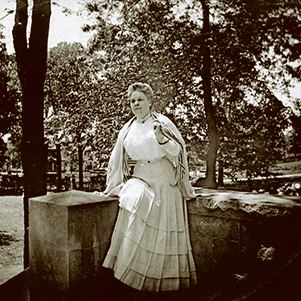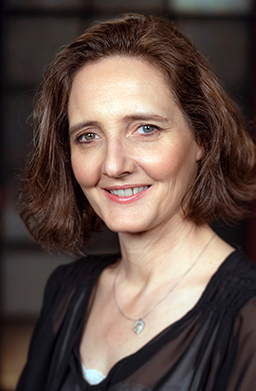
Josephine A. Pearson was a leader of the anti-suffrage movement in Tennessee.
When I was a little girl, long before I majored in women’s and gender studies, I often clashed with an uncle who contended that women should have never been granted the right to vote. I was so incredulous that anyone in the 1990s could hold such a backward notion that to this day I justify his argument as mere trolling (and try to avoid the subject to maintain familial harmony). The moral imperative of women’s suffrage is so palpable to me that I have rarely considered the precarious stakes of the 19th amendment’s ratification. This July, to celebrate 100 years of female enfranchisement in the United States, PBS is airing the edifying one-hour documentary By One Vote: Woman Suffrage in the South, which elucidates the vital role of Southerners in the fight for women’s voting rights.
Produced, directed and written by Mary Makley ’88 for Nashville Public Television, By One Vote uses archival footage and expert interviews to chronicle the radical rise of first-wave feminism through the single Tennessee “aye” that, in 1920, cemented women’s right to vote in all U.S. elections. Singer Rosanne Cash narrates, offering a cool, palliating voice to guide audiences through the near-century in which suffragists battled male lawmakers (and wealthy white women) who hoped to maintain the status quo.
By One Vote charts the flow of mid-19th-century social crusading from abolition to temperance to women’s suffrage, as progressives began to intellectually link the horrors of slavery and black marginalization to the suffering and subjugation of women. (Much as the civil rights movement helped spur women’s liberation, as many frustrated female activists endured the hypocritical chauvinism of their male counterparts, it’s no coincidence that the social, industrial and educational upheavals of the Civil War helped usher in long-lasting changes to women’s rights.) As the documentary reminds us, American women had little to no legal authority until the 20th century, forcing them risk their entire livelihoods on marriages that might go sour and leave them destitute.

Mary Makley ’88 chronicles the lead-up to the single Tennessee “aye” that cemented the right of U.S. women to vote. At Amherst, Makley was a math major.
By One Vote intricately details the factions within the pro-suffrage community, including those who hoped to appeal to lawmakers’ empathy and ethical reasoning— mostly older, married women—and those who deemed weaponized anger the only course toward victory: mostly younger, single women. These suffragettes endured police violence while protesting and forced feedings during hunger strikes. Many Southern suffragists talked out of both sides of their mouth when it came to race, publicly playing down the importance of black women’s enfranchisement while quietly buoying the black community to fight for the vote. (Black women ended up a key bloc in the Southern movement.) Most interestingly, By One Vote examines the vehement upper-class women’s groups who opposed suffrage under the belief that they’d be able to maintain social and fiscal supremacy if they could protect the political infrastructures from which they benefitted. Sound familiar?
The film tensely reconstructs the tie-breaking vote that sanctified women’s rights. The proposed constitutional amendment, which prohibited states and the federal government from denying the right to vote to U.S. citizens on the basis of sex, required 36 states to secure ratification. It had already been defeated in all other Southern states but Texas and Arkansas. Of the 99 Tennessee legislators, 50 voted in favor. The swing vote hinged on 25-year-old Harry T. Burn, who was finally swayed by a letter from his mother. She urged him to not “forget to be a good boy and help Mrs. ‘Thomas Catt’ with her ‘Rats,’” referring to legendary suffragist Carrie Chapman Catt. You can practically feel the sweat in the chamber on that boiling August day as modern historians recount this history-defining moment.
Consider By One Vote a worthwhile companion to FX’s miniseries Mrs. America, which recounts the stagnation of the Equal Rights Amendment thanks to the handiwork of conservative activist Phyllis Schlafly, artfully played by Cate Blanchett. While women’s lib typically makes for “sexier” entertainment, women’s suffrage upholds a uniquely brutal legacy.
Bahr is a film and TV critic. Her work has appeared in the Hollywood Reporter, Washington Post and elsewhere.
